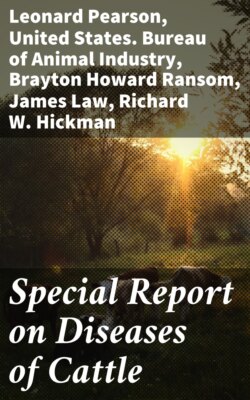Читать книгу Special Report on Diseases of Cattle - Lowe - Страница 37
На сайте Литреса книга снята с продажи.
INDIGESTION IN CALVES (GASTROINTESTINAL CATARRH, DIARRHEA, OR SCOUR).
ОглавлениеCalves are subject to a form of diarrhea to which the foregoing designations have been applied.
Causes.—Calves that suck their dams are not frequently affected with this disease, though it may be occasioned by their sucking at long intervals and thus overloading the stomach and bringing on indigestion, or from improper feeding of the dam on soft, watery, or damaged feeds. Suckling the calf at irregular times may also cause it. Exposure to damp and cold is a potent predisposing cause. Calves separated from their dams and fed considerable quantities of cold milk at long intervals are liable to contract this form of indigestion. Calves fed on artificial feed, used as a substitute for milk, frequently contract it. Damaged feed, sour or rotten milk, milk from dirty cans, skim milk from a dirty creamery skim-milk vat, skim milk hauled warm, exposed to the sun and fed from unclean buckets may all cause this disease.
Symptoms.—The calf is depressed; appetite is poor; sometimes there is fever; the extremities are cold. The dung becomes gradually softer and lighter in color until it is cream colored and little thicker than milk. It has a most offensive odor and may contain clumps of curd. Later it contains mucus and gas bubbles. It sticks to the hair of the tail and buttocks, causing the hair to drop off and the skin to become irritated. There may be pain on passing dung and also abdominal or colicky pain. The calf stands about with the back arched and belly contracted. There may be tympanites. Great weakness ensues in severe cases, and without prompt and successful treatment death soon follows.
Treatment.—Remove the cause. Give appropriate feed of best quality in small quantities. Make sure that the cow furnishing the milk is healthy and is properly fed. Clean all milk vessels. Clean and disinfect the stalls. For the diarrhea give two raw eggs or a cup of strong coffee. If the case is severe, give 1 ounce of castor oil with a teaspoonful of creolin and 20 grains of subnitrate of bismuth. Repeat the bismuth and creolin with flaxseed tea every four hours. Tannopin may be used in doses of 15 to 30 grains.
Calves artificially fed on whole or skim milk should receive only such milk as is sweet and has been handled in a sanitary manner. Milk should always be warmed to the temperature of the body before feeding. When calves artificially milk-fed develop diarrhea, the use of the following treatment has given excellent results in many cases: Immediately after milking, or the separation of the skim milk from the cream, formalin in the proportion of 1 to 4,000 should be added to the milk which is used for feeding; this may be closely approximated by adding four drops of formalin to each quart of milk. This medicated milk should be fed to the calf in the usual quantity. When the diarrhea is not controlled in three or four days by this treatment, the additional use of some of the agents recommended above may assist in a recovery.
